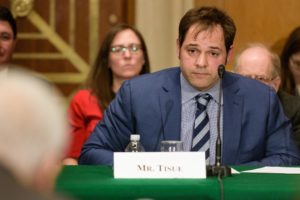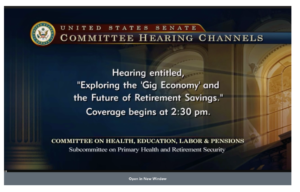27 Feb Mr. Tisue Goes To Washington
Is the Gig economy setting the stage for a return of the OpenMEP® retirement plan concept?
TAG Resources President Troy Tisue thinks so.
On Tuesday, February 6, 2018, the U.S. Senate subcommittee on Primary Health and Retirement Security opened a hearing and roundtable discussion on the impact of gig workers and the future of retirement savings which included Troy Tisue, President of TAG Resources, a leader in retirement plan administration outsourcing.

About the Gig Economy:
The US Department of Labor and Statistics classifies a “gig” worker as a contingent worker or independent contractor. According to the statistics cited by any number of surveys and from any random think tank, the number of gig workers might surpass 40% of the workforce in the next couple of years.
Tisue’s statement to the subcommittee focused on TAG Resources’ retirement program, Open MEP®. In 2004, TAG first provided professional plan fiduciary service and aggregation of plan investments for small and medium 401(k) plan sponsors through use of the multiple employer plan (MEP) model, where unrelated employers could establish and co-sponsor a more robust single retirement plan. Then, TAG created the Open MEP® concept to leverage cost, provide a better service model, and provide fiduciary protection.
“There are a number of designs under which the Open MEP® structure could be used for the gig economy; these are only the most obvious examples. Permitting Open MEPs would enable the innovativeness of the marketplace to design MEPs which could accommodate most circumstances, while providing the independent worker both ERISA protections as well as institutional pricing which would not otherwise be available to her or him,” said Tisue. “TAG Resources has for many years been in the marketplace as the country’s leading aggregator of plan services for both closed MEPs and for those employers who would otherwise benefit from changes which would permit Open MEPs.”
Other participants in the subcommittee hearing included Camille Olson, of Chicago, representing The U.S. Chamber Of Commerce; Vikki Nunn, CPA and Shareholder of
the accounting firm of Porter, Muirhead, Cornia & Howard, of Casper, WY; and Monique Morrissey, an Economist with the Economic Policy Institute in Washington, DC.
Click here to view the Subcommittee Hearing

Excerpts from statements about the subcommittee hearing and roundtable discussion
The hype of the ‘gig economy’ has put a new face on the damaging trend of erosion in workers’ protections and benefits—a trend that has been occurring for decades. We may be discussing new technology and using new lingo, but the challenges are not new. How do we make sure all workers are well protected and fairly compensated? How do we make sure all workers have the rights and protections we’ve fought for since the New Deal? In a changing world, how do we address the new threats and provide new protections to ensure workers’ safety, economic security, and voice? I am optimistic we can look for bipartisan answers to these questions, and work together toward solutions.
Senator Patty Murray (D-WA)
Read Senator Murray’s full statement here.
Excerpts from participants of the subcommittee hearing and roundtable discussion
One mechanism that holds substantial promise to help address this growing problem is to make “employer-type” retirement savings plans available to the contingent workforce through the “open multiple employer retirement plan,” or the “Open MEP.®”
Troy Tisue
President, TAG Resources, LLC
Knoxville, Tennessee
Read Mr. Tisue’s full statement here.…they (gig economy workers) have participated in their (previous) employer’s sponsored 401(k) plans, and have arrived at a time when catch-up contributions would be allowed only to find themselves with no access to those plans and with a much more volatile income stream. For most, a Solo(k) is a great vehicle to help them meet their retirement needs. It is particularly helpful since income may fluctuate a great deal from year to year. With a Solo(k), they can put more away in a high earnings year and can end up funding more for retirement than their employer and personal contributions were providing before.
Vikki Nunn, CPA
Business owner of Porter, Muirhead, Cornia & Howard
Casper, Wyoming
Read Ms. Nunn’s full statement here.



No Comments